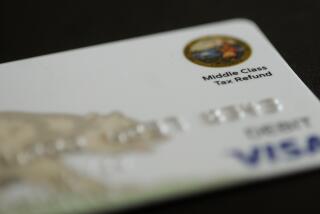How to Find a Lost Tax Payment
- Share via
If you believe that your tax payment might have gone astray, try searching the state controller’s archives.
The abandoned accounts owed to the Franchise Tax Board and the Internal Revenue Service are listed in the unclaimed-property section of the state controller’s Web site, at https://www.sco.ca.gov.
Alas, there is no easy or quick way to search. You must plug in the name that might have been on your check and then read the details under each corresponding match. For instance, if you wrote the check to the IRS, type “IRS” into the box and click “search.” That will call up about 20 accounts that match that name. If you think you would have spelled out “Internal Revenue Service,” that’s how you should search. You’ll find 136 matches this way. If you put periods between “I.R.S.,” there’s one match.
To get details on claims, click the claim button and you’ll find the specific amount, a brief description of what the claim is--such as “vendor payment,” “cashier’s check,” “refund,” or “dividend payment”--as well as who escheated the funds and for whom they were meant.
If you are looking for a missing tax payment made by cashier’s check or money order, there is no way to call up claims based on the amount of the check or the issuing bank. (Disputes would not arise in the case of a personal check, because if the IRS or FTB did not receive the check, the money would never have been deducted from your account.)
The database allows searches only by the property owner’s name. In the case of a taxpayer making a payment, the owner is the intended recipient--in California, either the FTB or the IRS.
You must check the hundreds of abandoned accounts owed to the IRS and FTB on a claim-by-claim basis, looking for the amount you paid and the bank where you bought the cashier’s check. It’s arduous, but if it helps resolve your tax dispute, it may be worth it.
You may also check the database if you’re missing a refund or some other payment due to you.
In these cases, you would search under your own name. But the database is fussy--make sure to check all possible variations.
More to Read
Inside the business of entertainment
The Wide Shot brings you news, analysis and insights on everything from streaming wars to production — and what it all means for the future.
You may occasionally receive promotional content from the Los Angeles Times.










